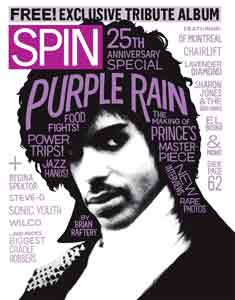
It’s not every day that a blog network takes over a storied print business, but it happened last week when Hollywood’s Buzzmedia bought Spin Media and its music mag, Spin.
Buzzmedia already has a portfolio of wide-reaching music blogs, including Stereogum and Idolator, along with some popular celebrity websites. But Spin, which operates from a New York office, is Buzzmedia’s first print product, albeit a downsized one. It announced this year that it will publish six issues this year, compared with 11 last year.
Buzzmedia Chief Executive Tyler Goldman said there is a future for the print product, but that much of the focus will be on expanding the magazine online – Spin has already tuned up its digital offerings with a tablet app, streaming music player and collection of music blogs.
“What was attractive was that they were making a great transition (to digital),” he said. “We’re going to accelerate the transition.”
Despite the decline in its print business, Spin is still a recognizable title in the music world, dating back to its 1985 founding by Bob Guccione Jr., the son of the late Penthouse magazine founder. But its value has decreased over the years, reflecting the challenges of the greater publishing industry as myriad online alternatives – including Buzzmedia blogs – have popped up to fracture readership and advertisers.
When Guccione first sold the magazine in 1997, it went for a reported $42 million, before changing hands again in 2006 for a reported $5 million to McEvoy Group, a San Francisco publishing company. Terms of last week’s sale were not disclosed, but magazine industry sources speculated the price was low.
Goldman, who started a venture capital-backed blog-buying spree a handful of years ago, has emerged a winner in the paradigm shift. Buzzmedia sites attract about 120 million unique monthly visitors a month – and big advertisers.
Still, transitioning Spin’s business from paper to the web will be a substantial challenge and risk, said Samir Husni, who runs the Magazine Innovation Center at the University of Mississippi. He noted that despite its strong brand name, when the magazine cut back on publication earlier this year, it indicated that there could be more problems to follow in other media as well.
“Anytime a magazine cuts its frequency, it means business is not good,” Husni said. “If you can’t survive in print, you can’t survive online.”
Cultural relevance
Spin is known now as a music-focused title, but when it was founded by Guccione 27 years ago, the idea was to create a sort of Rolling Stone for Generation X, with stories of political and cultural relevance. For example, there was a long-running column in the magazine on the AIDS epidemic.
Throughout the years, the focus narrowed to music, however, and circulation dropped. In 2000, print circulation was at 540,000 copies. Last year, the magazine decreased its minimum guaranteed circulation that it offers to advertisers from 450,000 to 350,000 copies. Meanwhile, it cut print editions and unveiled a new look, with thicker pages and a larger format, to distinguish the newer editions.
Goldman saw greater potential, though, and approached the magazine about a deal in the spring.
When rumors of a sale were first reported in the media last month, Guccione expressed his regrets to Media Industry Newsletter.
“It all saddens me,” he told the newsletter’s editor in chief, Steven Cohn. “The mistake made, over time and not by one person, was shrinking Spin to just a music magazine.”
But while Spin will keep its focus on music, Goldman will try to make it more than just a magazine. The effort will include hiring more editorial staffers, he said. Spin currently has about 15 editorial employees that create content for the print and online products, according to its website, along with a stable of many more contributing bloggers.
The additional content will include coverage of music industry news and festivals, he said, with the goal of making Spin.com a hub for music fans interested in a broad array of genres. It currently attracts about 1 million unique monthly visitors.
Meanwhile, he’ll use Buzzmedia’s wide reach and clout with advertisers to try to secure more digital ad dollars.
Also included in the deal is Spin magazine’s events business. Goldman said there’s a big opportunity to create campaigns for brands using Spin’s widely known name in the music industry. For example, in January, Microsoft Corp.’s Bing search engine sponsored a Spin magazine series of concerts and DJ sets at the Sundance Film Festival.
Justin Lefkovitch, chief executive of Mirrored Media, a Santa Monica company that coordinates music-related promotions for brands, said that demand is high. He is involved in a campaign for Honda Motor Co.’s Acura car line that cross-promotes a new album being released by Metric, a Canadian new-wave band that has been featured in Spin.
“Brands are starting to see the importance of true music integration,” he said. “It’s all about creating the cool factor.”
